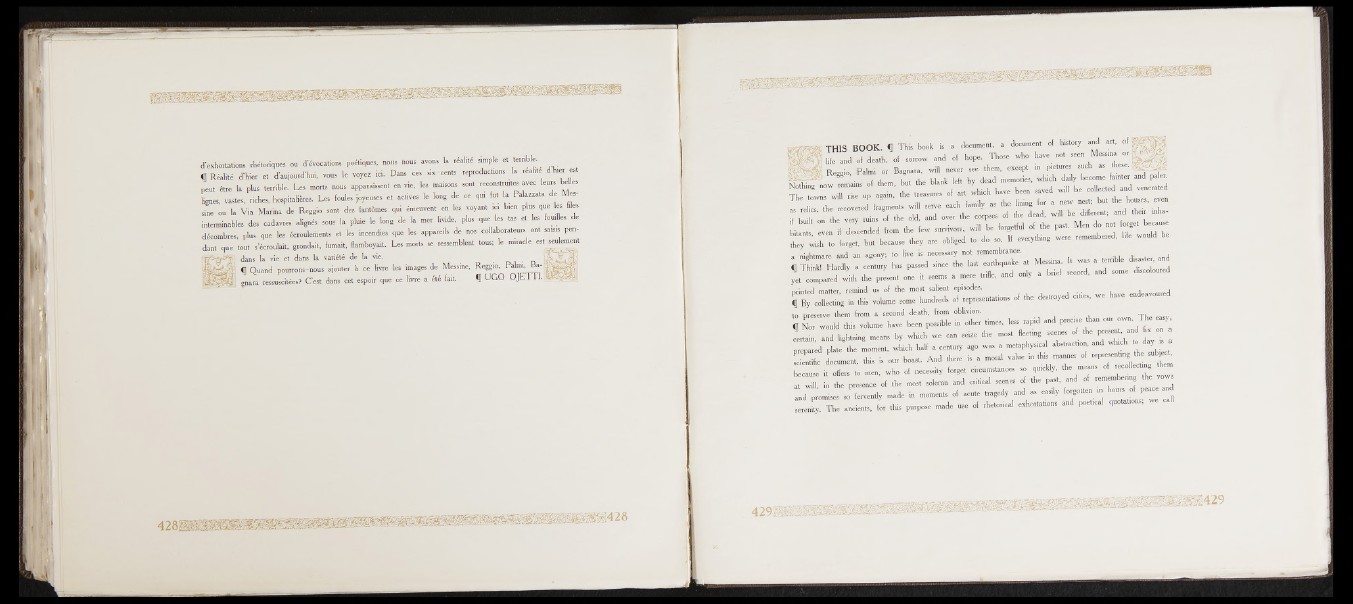
d’exhortations rhétoriques ou d’évocations poétiques, nous nous avons la réalité simple et terrible
Q Réalité d’hier et d'aujourd’hui, vous le voyez ici. Daus ces six-cents reproductions la réalité d hier es
peut Être la plus terrible. Les morts nous apparaissent en vie, les maisons sont reconstruites avec leurs belles
lianes, vastes, riches, hospitalières. Les foules joyeuses et actives le long de ce qm fut la Palazzata de Messine
ou la Via Marina de Reggio sont des fantômes qui émeuvent en les voyant l a bien plus,que les .es
interminables des cadavres alignés sous la pluie I long de la mer livide, plus que les tas et les fouilles de
décombres, plus que les écroulements el les incendies que les appareils de nos collaborateurs ont saisis ,pen-
dant que tout s'écroulait, grondait, fumait, flamboyait. Les morts se ressemblent tous; le miracle cst j e u W n
¡¡É®§lÉ| dans la vie et dans la variété de la vie. . |
H q Quand pourrons-nous ajouter à ce livre les images de Messine, Reggio, Palmi, Ba-'ggj
m gnara ressuscitées? C’est dans cet espoir que ce livre a été fait. q UGO O jE T T l . f c
I THIS BOOK, q This book I a document, a document of history and art,
I I of death, of Sorrow and of hope. Those who have not seen Messina or.
M Reggio, Palmi or Bagnara, will never see them, except in pictures such as these.
a nightmare and an agony; to live is necessary not remembrance.
q ” S Hardly a ce^ufy has passed since the las. earthquake at Messina. It was a terrible I B and
yet ^ p a ^ t h the p i n t one i, seems a mere trifle, and only a brief record, and some discoloured
nr in ted matter remind us of the most salient episodes. ,
q By collecting m tins volume some hundreds of representations of the destroyed cities, we have endeavoured
to oreserve them from a second death, from oblivion.
q Nor would this volume have been possible in other times, less rapid and precise * an our owm The ea |
certain, and lighting means by which we can seize die most fleeting sc^es of die present and fix on
prepared plate the moment, which half a century ago Was a metaphysical abstraction, and
L iltific document, this is our boast. And there is a mo,a. value in this manner of
because it offers to men, who of necessity forget circumstances so quickly, the means of recollectmg them
■ . h presence of the most solemn and critical scenes of the pas, and of remembering th^ vow
and promises so fervently made in moments of acute tragedy and as easfly forgotten in M ( g n g
serenity. The ancients, for this purpose made use of rhetorical exhortations and poetical quotations,